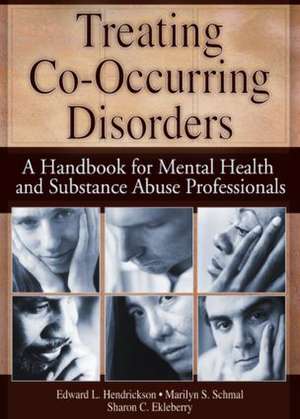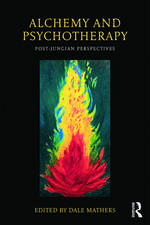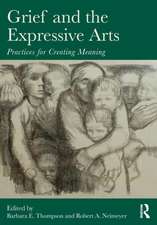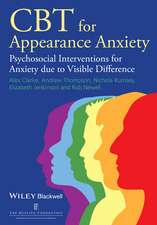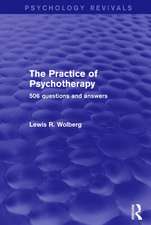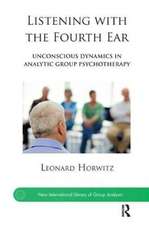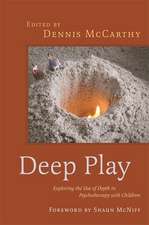Treating Co-Occurring Disorders: A Handbook for Mental Health and Substance Abuse Professionals
Autor Sharon Ekleberryen Limba Engleză Paperback – 23 mar 2004
Caseloads that include mental health, substance use, and co-occurring disorders are becoming more and more common, yet most texts in this area focus on one specific type of disorder. This unique handbook reflects the reality facing mental health and substance abuse professionals in their daily practices, focusing on how to effectively manage caseloads that include individuals with vastly differing levels of functioning. Providing diagnostic criteria, treatment regimens, and a great deal more, Treating Co-Occurring Disorders: A Handbook for Mental Health and Substance Abuse Professionals is an exceptional single source for useful information on handling all of these types of cases and clients.
Treating Co-Occurring Disorders: A Handbook for Mental Health and Substance Abuse Professionals describes the psychiatric and substance use disorders that commonly co-occur and examines the evolution of co-occurring concepts and treatment. It provides an overview of relapse prevention and symptom management models for use with clients with co-occurring disorders and another covering mental health and substance abuse recovery movements.
Treating Co-Occurring Disorders: A Handbook for Mental Health and Substance Abuse Professionals will bring you closer to topics that impact day-to-day practice, including:
- conducting comprehensive assessments for individuals with psychiatric and substance use symptoms
- providing individual, group, family, and case management interventions for clients of differing levels of function who exhibit psychiatric and substance abuse symptoms
- identifying standard interventions for all clients with co-occurring disorders
- measuring change and establishing reasonable treatment outcome performance standards for these clients
- supervising staff who work with multifarious caseloads
Tables, figures, and a generous portion of intriguing case descriptions will help you apply the information in this useful volume to your own work.
| Toate formatele și edițiile | Preț | Express |
|---|---|---|
| Paperback (1) | 334.71 lei 6-8 săpt. | |
| Taylor & Francis – 23 mar 2004 | 334.71 lei 6-8 săpt. | |
| Hardback (1) | 1100.32 lei 6-8 săpt. | |
| Taylor & Francis – 26 mar 2004 | 1100.32 lei 6-8 săpt. |
Preț: 334.71 lei
Preț vechi: 352.33 lei
-5% Nou
Puncte Express: 502
Preț estimativ în valută:
64.05€ • 67.05$ • 52.99£
64.05€ • 67.05$ • 52.99£
Carte tipărită la comandă
Livrare economică 07-21 aprilie
Preluare comenzi: 021 569.72.76
Specificații
ISBN-13: 9780789018021
ISBN-10: 0789018020
Pagini: 260
Dimensiuni: 152 x 229 x 17 mm
Greutate: 0.36 kg
Ediția:New.
Editura: Taylor & Francis
Colecția Routledge
Locul publicării:Oxford, United Kingdom
ISBN-10: 0789018020
Pagini: 260
Dimensiuni: 152 x 229 x 17 mm
Greutate: 0.36 kg
Ediția:New.
Editura: Taylor & Francis
Colecția Routledge
Locul publicării:Oxford, United Kingdom
Public țintă
Professional Practice & DevelopmentCuprins
Preface. The New Reality: Multifarious Caseloads. Prevalence of Co-Occurring Disorders. Types of Clients Found in a Multifarious Caseload. Essential Philosophical View. Essential Knowledge and Skills. Integrated Treatment. A Competency-Based Focus. Treatment Goals. Standard Interventions for All Clients with Co-Occurring Disorders. Conclusion. Then and Now: Concepts and Treatment of Co-Occurring Disorders. Genesis and Early Concepts. Early Treatment Activities and National Acceptance. Factors Affecting the Development of Services for Individuals with Co-Occurring Disorders. Building the Infrastructure for a System of Care for Individuals with Co-Occurring Disorders. Current Conditions and the Future. Frequently Co-Occurring Axis I Psychiatric and Substance Use Disorders. Substance-Related Disorders. Mood Disorders. Anxiety Disorders. Psychotic Disorders. Disruptive Behavior Disorders. Dissociative Disorders. Eating Disorders. Impulse Control Disorders. Conclusion. Personality Disorders that Frequently Co-Occur with Substance Use Disorders. Personality Disorders: Definition. Personality Disorders and Co-Occurring Substance Use and Mental Disorders. Cluster B Personality. Cluster A Personality Disorders. Cluster C Personality Disorders. Conclusion. Assessment. Identifying a Substance Use Problem. Differentiating Substance-Induced Disorders from Co-Occurring Disorders. Subgroups of Individuals with Co-Occurring Disorders. Consequences of Substance Use. Motivation for Continued Substance Use. History of Approach to Treatment and Recovery. Matching Treatment Needs with Treatment Possibilities. Conclusion. Introduction to Treatment: Goals and Themes. Treatment Goals. Treatment Themes. Conclusion. Psychoeducation and Group Treatment. Psychoeducation. Promoting Personalization of Psychoeducation Material. Participant Limitations in Psychoeducation Settings. Designing Psychoeducation Programs for Multifarious Caseloads. The Role of the Leader. Reasonable Goals for a Psychoeducation Program. Group Therapy. Group Membership. Operating Rules for the Group. Group Logistics. A Typical Group Session for More-Impaired Individuals. A Typical Group Session for Less-Impaired Individuals. Conclusion. Individual Therapy and Case Management. Individual Therapy. Case Management. Functions of Case Management. Models of Case Management. Individual Therapy and Case Management with a Multifarious Caseload. Conclusion. Family Interventions. Family Intervention Methods. Factors That Hinder Family Involvement in Treatment. Promoting Family Involvement. Important Family Treatment Concepts. A Model for Identifying Family Change. Stuck Points in the Family Change Process. Conclusion. Promoting Long-Term Stability: Relapse Prevention and Symptom Management. Cluster of Interventions for Prerecovery and Antitreatment Clients. Cluster of Interventions for Early Recovery and Treatment-Engaged Clients. Cluster of Interventions for Later Recovery and Minimal or Posttreatment Clients. When Knowledge and Skills Do Not Work. Conclusion. Substance Abuse and Mental Health Recovery Movements. Mental.
Descriere
Caseloads that include mental health, substance use, and co-occurring disorders are becoming more and more common, yet most texts in this area focus on one specific type of disorder. This unique handbook reflects the reality facing mental health and substance abuse professionals in their daily practices, focusing on how to effectively manage caseloads that include individuals with vastly differing levels of functioning. Treating Co-Occurring Disorders: A Handbook for Mental Health and Substance Abuse Professionals is an exceptional single source for useful information on handling all of these types of cases and clients. Tables, figures, and a generous portion of intriguing case descriptions will help you apply the information in this useful volume to your own work.
To view an excerpt online, find the book in our QuickSearch catalog at www.HaworthPress.com.
To view an excerpt online, find the book in our QuickSearch catalog at www.HaworthPress.com.
